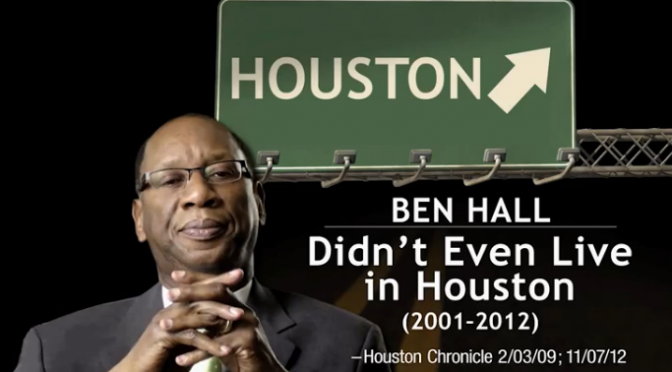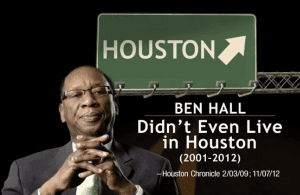So far in his campaign for Houston’s top job, candidate Ben Hall has had his ups and downs… most notably some issues with the wrong type of social media, timely payment of taxes, and a dispute over what exactly counts for residency. But it’s quite possible that the biggest problem with Hall’s Mayoral strategy has less to do with him, and more to do with how his chosen base of support is rapidly declining.
Houston Chronicle reporter Bill King took a look at shifting demographics in the city’s core African-American communities. Here’s what he found…
“The principal reason that Turner and Locke lost their mayoral bids was a dramatic decline in African-American turnout in city elections.
I looked at the election results in five key, predominantly African-American precincts from around the city. In the 2001 election when Brown faced a stiff challenge from Orlando Sanchez for his third term, the turnout in the general election in these five precincts averaged just less than 30 percent.
For the runoff between Brown and Sanchez, the turnout actually went up to almost 37 percent. The five precincts produced more than 5,600 votes, and Brown won more than 95 percent of those votes.
In 2003, when Bill White, Orlando Sanchez and Sylvester Turner squared off in the general election, the turnout in these precincts was about the same as the 2001 general election, but Turner got only about 80 percent of the vote compared to Brown’s 95 percent.
This was the decisive factor in Turner not making the runoff. With him eliminated, turnout in the runoff in these precincts dropped by almost half to just 17 percent.
In 2009, Locke was unable to motivate African-American turnout or rack up the margins that Brown achieved in 2001. In the 2009 general election and in the runoff, turnout in these precincts was only 15 percent, with Locke winning about 84 percent of the vote.
From just these five precincts, Turner got 1,650 fewer votes in 2003 than Brown did in the 2001 runoff. In the 2009 runoff, Locke got a staggering 3,300 fewer votes than Brown did in the 2001 runoff. The significance of this drop in vote totals is highlighted when you consider that Locke lost by fewer than 9,000 votes citywide.”
First off, I do want to state that it’s not unfair to just assume that all African- Americans will vote for a candidate based solely on race. That is of course a stereotype. But it is fair to asses that each of these candidates campaigned heavily in the African- American community… so much so that they probably saw them as their “base of support”. By all indications, the Hall campaign is following a similar path.
So what is happening that so many African-Americans are moving out of the central city, and even out of Houston city limits altogether?
For poorer citizens, the reason is simple… gentrification. Houston’s historically black neighborhoods are being rapidly torn down and replaced by an upper income, young adult class. People that used to live in 3rd ward or 4th ward can no longer afford to be there. If they own property, they are under immense pressure to sell so that developers can build the type of housing that suits the “new urban” clientele. As a result, many African-Americans are leaving Houston proper for suburbs like Pearland and Missouri City, because it’s what they can afford. NPR covered this trend in 2012 where State Rep. Garnet Coleman discussed the alarming rate at which the city is changing.
Of course the way to confirm these trends is to take a look at the census records themselves. In 2000, the city of Pearland had 37,640 people, and was 5.3% African- American… or about 2,000 people. But by the 2010 census, Pearland’s overall population had exploded to 91,252, and the African- American population swelled from 5.3% to 16.4%… or about 15,000 people. That means the city of Pearland gained a net number of 13,000 African- American residents between 2000 and 2010, a disparity that’s probably grown larger now that it’s 2013. Of course Houston’s overall population, and it’s African- American population both increased during the decade as well, but by much smaller margins than the rate of growth seen in Pearland. It’s fair to assume that as newer residents moved into Houston, some of the people already in neighborhoods like 3rd and 4th Ward were priced out. Many of the newer citizens coming in don’t share the same cultural, communal or political alliances as those there previously.
Now for richer citizens like Ben Hall, other factors are at play. He certainly can afford to live anywhere he wishes, but he chose to build a home in Piney Point Village. That could possibly be because the tax burden is lower, or just because it’s an area where many wealthy people choose to live. It’s not fair to speculate on Mr. Hall’s reasons for that choice, but it’s worth recognizing that many others have chosen a similar path. Either way, it’s fair to say that it’s a decision that many have made over the last 10 years. And if assertions turn out to be true, that’s not a good indicator for the Hall campaign.

